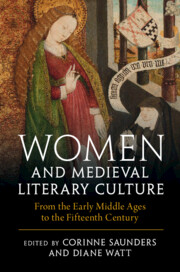Book contents
- Women and Medieval Literary Culture
- Women and Medieval Literary Culture
- Copyright page
- Contents
- Illustrations
- Contributors
- Acknowledgements
- Introduction
- I Patrons, Owners, Writers, and Readers in England and Europe
- II Circles and Communities in England
- III Health, Conduct, and Knowledge
- IV Genre and Gender
- Chapter 11 Lyrics
- Chapter 12 ‘It satte me wel bet ay in a cave / To bidde and rede on holy seyntes lyves’
- Chapter 13 Tears, Mediation, and Literary Entanglement
- Chapter 14 Convent and City
- Chapter 15 Women and Romance
- Chapter 16 Trouble and Strife in the Old French Fabliaux
- Chapter 17 Chaucer and Gower
- V Women as Authors
- General Index
- Index of Manuscripts
- References
Chapter 17 - Chaucer and Gower
from IV - Genre and Gender
Published online by Cambridge University Press: 28 July 2023
- Women and Medieval Literary Culture
- Women and Medieval Literary Culture
- Copyright page
- Contents
- Illustrations
- Contributors
- Acknowledgements
- Introduction
- I Patrons, Owners, Writers, and Readers in England and Europe
- II Circles and Communities in England
- III Health, Conduct, and Knowledge
- IV Genre and Gender
- Chapter 11 Lyrics
- Chapter 12 ‘It satte me wel bet ay in a cave / To bidde and rede on holy seyntes lyves’
- Chapter 13 Tears, Mediation, and Literary Entanglement
- Chapter 14 Convent and City
- Chapter 15 Women and Romance
- Chapter 16 Trouble and Strife in the Old French Fabliaux
- Chapter 17 Chaucer and Gower
- V Women as Authors
- General Index
- Index of Manuscripts
- References
Summary
This essay focuses on the two most influential English authors of the later medieval period, Geoffrey Chaucer and his contemporary, John Gower, to analyse the roles of women within their corpus, both as subjects and as extra-textual readers. Bridges asks what femininity enables in their works and how ߝ and what ߝwomen mean, emphasising the embeddedness of both writers in long-established and international textual cultures. Central to her analysis is the notion of a hermeneutic that constructs women and femininity in ethical terms, as bound up with notions of vice and virtue. The essay explores questions of voice, agency, and genre across Chaucerߣs works to demonstrate the intimate connection of femininity with questions of reading and interpretation. For Gower too, ethics are shown to be a central focus, and treatments of femininity open onto moral and political debates. Differing presentations of women treated in common by Chaucer and Gower illuminate their ideological priorities and contrasting practices of poetic translatio studii. For both, womenߣs presence proves a complex, powerful, but often ambiguous textual phenomenon.
- Type
- Chapter
- Information
- Women and Medieval Literary CultureFrom the Early Middle Ages to the Fifteenth Century, pp. 342 - 376Publisher: Cambridge University PressPrint publication year: 2023

